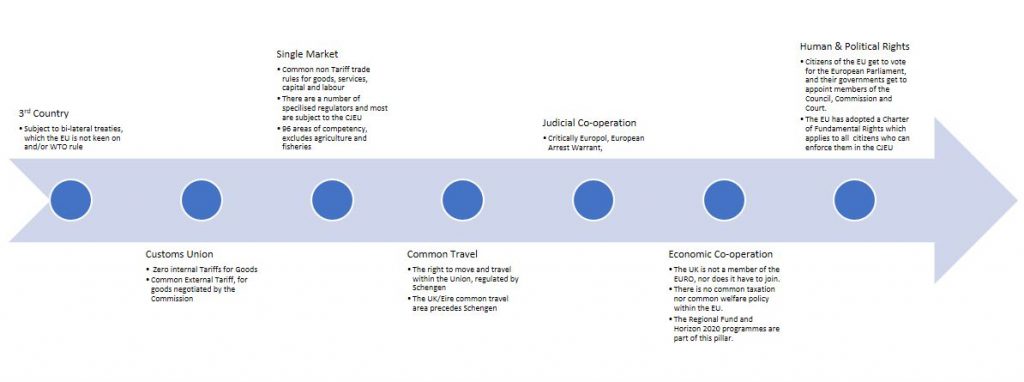Over the summer, most Brexit/Remain players have been on manoeuvres and Jeremy Corbyn’s appearance on the Marr show together with various clarifications have ensured for Labour at least membership of the single market has become a focus for what a post-brexit relationship would look like. In my opinion, if we were to stay in the single market via the European Economic Area, we might as well stay in and keep our MEPs, Council Seat (& Veto), Commissioner, Judges, the rebate, our opt-out from common borders (Schengen) and our indefinite opt-out in joining the Euro. I support these things, and staying in, I understand why Brexiters have now come to oppose the single market. ….
The single market is the harmonisation of non-tariff trade barriers. Critically for the UK, it applies to services as well as goods, but also Labour and Capital. The reason that services is important is that the UK exports a shed load to the EU.

My diagram illustrating the levels of engagement with the EU, moves from a 3rd country, via the Customs Unions which is about common tariffs, through the single market (EEA), to common borders and travel (Schengen), onto Judicial co-operation which the UK reviewed and adjusted in the 2010-2015 Parliament, through to Economic Co-operation, most intrusively membership of the Euro, but otherwise receipts from the Regional Development Fund and the R&D programmes, currently named Horizon 2020. Finally there are the citizenship rights, the right to vote and the right to judicial review based on the EU’s Charter of Fundamental Rights.
In the light of this Government’s attack on the right to judicial review, it’s possible that the citizenship rights are the most important to defend. EU citizens have the right of judicial review. The EU, unlike the UK, is a creature of Law, there is no residual crown prerogative, the organisations of the EU are bound by Law. The fact that while there may be five presidents, whom we cannot name, there are no Kings nor aristocrats. Also its nomenklatura are on the whole elected politicians, and in many countries, they send their best rather than their disgraced, past it, or 2nd raters. Also all these nominations are made by democratically accountable governments.
The focus on the single market has led the two main parties to conduct two debates. The Tories are looking at a transitional arrangement, which those closest to remain believe would need to be off-the-shelf i.e. utilise the EEA treaties and organisational infrastructure. This will leave them with the difficulty of the customs union, which would prohibit the negotiation of new free trade agreements and the Court (CJEU) which would need to be the final arbiter of the transitional treaty.
On the Left, there are those that argue that the EU Treaties prohibit nationalisations. Richard Seymour is one, and this view is reflected in the Morning Star, and rejected in the Independent by Ben Chu. Again it seems we can choose our facts to suit our prejudices.
The one thing I would say is that I am unclear that overcoming the EU’s legal system and its political majority is any harder than overcoming the entrenched power that will resist a Corbyn or other left government within the British State. Both the EU and the British State are areas of contention. The Left in the UK and Europe needs to build majorities and movements to overcome the power of the Right and the anti-State consenus from recovering fascist and Stalinist regimes is an aid, not a hindrance.
Are the Lexiters seriously suggesting we can build a socialist economy in one country?